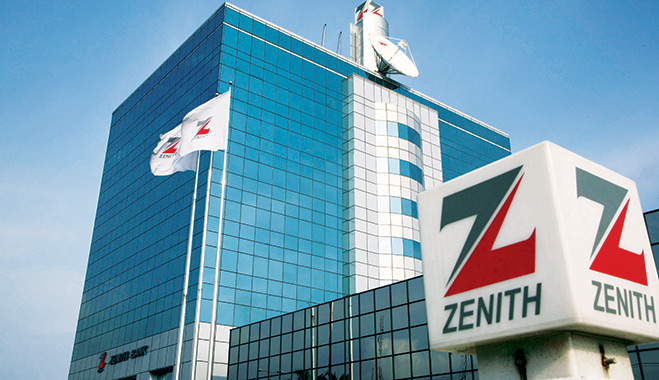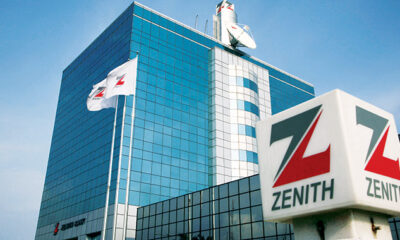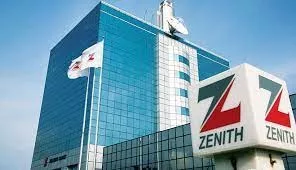Business
Easy Ways Zenith Inspires ESG Change in Finance

Easy Ways Zenith Inspires ESG Change in Finance
The Financial Services sector is now Nigeria’s top performer in governance maturity, with Zenith Bank, Stanbic IBTC Holdings, and Access Holdingsare leading in structured ESG integration.TTT
This was indicated in the 2025 IPMC ESG Ratings Report unveiled on Monday in Lagos.
According to the Corporate Governance Institute, ESG stands for Environmental, Social, and Governance. It is a framework used to evaluate a company’s sustainability and ethical impact.
Based on the report, the three banks recorded the highest levels of structured sustainability integration, board-level oversight, and transparent ESG reporting, even as the sector continues to lag in key climate-risk disclosures required under IFRS S2.
“The sector demonstrates the strongest governance maturity, with near-universal disclosure of board composition, risk management policies, and audit procedures.
However, only 12 per cent disclose financed emissions or climate-related credit exposures, creating a major blind spot under TCFD and IFRS S2 principles. Progressive banks are beginning to adopt green-lending frameworks, but without a harmonised taxonomy or verification.
“The Financial Services sector demonstrates Nigeria’s highest ESG integration maturity, with clear evidence of governance discipline and structured sustainability reporting. Leading institutions such as Zenith Bank Plc, Stanbic IBTC Holdings Plc, and Access Holdings Plc show measurable progress in embedding ESG principles into corporate strategy, risk oversight, and disclosure,” said the report.
The report revealed that Zenith Bank got an overall ESG score of 39 per cent with a balanced Environmental (14 per cent), Social (18 per cent), and Governance (39 per cent) performance. Following was Stanbic IBTC Holdings with an overall ESG score of 34 per cent, as it showed strong alignment with ISSB principles through sustainability-linked finance and transparent governance reporting. Access Holdings Plc got an overall ESG score of 32 per cent, with the report saying that Access integrates ESG at the enterprise level, linking it to lending criteria and customer engagement.
Read Also: Zenith Bank Staff Fund boosts stake with N2.3B buy
The report added that banks and other financial institutions exhibit the highest governance disclosure levels among Nigerian corporates, with their board independence and audit transparency aligning closely with guidelines of the Nigerian Exchange Limited and the Securities and Exchange Commission.
“However, financed emissions, a critical component under IFRS S2, are disclosed by only two institutions (= 12 per cent), and none have external assurance of climate-risk data. Social disclosures (employee training, customer protection, and financial inclusion) are improving, while gender diversity at the senior management level remains below 25 per cent. Environmental aspects are emerging mainly through green-lending frameworks and participation in climate-finance initiatives.
“The sector is policy-strong but evidence-light; reporting frameworks exist, but assurance and Scope 3 accounting must evolve for Nigeria’s financial sector to achieve regional parity with Kenya and South Africa. Investor implications: ESG-linked lending and green bonds remain nascent, representing near-term growth opportunities.
Financed-emission disclosure is absent, creating blind spots for climate-risk pricing. Institutions aligning early with ISSB S1/S2 and CBN Sustainable Banking updates are likely to enjoy lower borrowing costs and stronger international credibility.”
Speaking at the launch of the report, the Chairman of IPMC Nigeria, Mr Robert Ade-Odiachi, explained that the organisation’s ESG Ratings Report is based on extensive data collection, including repeated requests to companies and the use of publicly available information when firms fail to provide disclosures. He stressed that many Nigerian companies do not publish enough data, making accurate ESG assessments difficult.
He noted that Nigeria ranks third in Africa, behind Kenya and South Africa, with an ESG performance level of about 32 per cent, which he described as low. He argued that poor ESG compliance reflects weak governance and ultimately leads to lower returns on investment.
The chairman emphasised that strong ESG performance is crucial for attracting foreign direct investment, which he said is essential for long-term economic growth. He explained that foreign direct investors offer cheaper, longer-term capital but require strong ESG governance, unlike portfolio investors who are less concerned about sustainability.
“Our objective is to raise these issues and let everybody see that and how we can carry out a remedial action where we are so low with compliance.
What are the consequences of being low in compliance? We are talking about sustainability. We are talking about growth. We are talking about profits. We are talking about returns on investment.
We are talking about all kinds of things. And if you are low in the ESG rating, it shows that you are not being properly managed. Your governance is low. And certainly, if your governance is low, your returns on investment, and stuff like that would be low as well.








